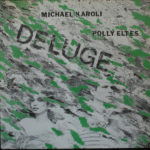
Even for me, what I’m going to write next seems something out of a fever dream. Polly Eltes, elite, English model/actress seen in the pages of Italian Vogue, and on the catwalks of Europe, teams up with CAN guitarist Michael Karoli to create a forward-thinking blast of Fourth World dub music. If I didn’t have a copy of 1984’s Deluge, I’d start questioning my sanity, but here it is: Michael Karoli & Polly Eltes Deluge. If I didn’t research this following bit of backstory, I wouldn’t quite understand Deluge, either.

When CAN formally/informally disbanded in the late ’70s, this period of transition allowed all its members to stretch out and further explore their own personal, musical eccentricities. Some, like bassist Holger Czukay would go deep into world and tape-based plunderphonic music, creating intriguing evolutions of music you’d hear in his Ethnological Forensic Series (E.F.S.) songs found in any proper CAN album. Others like, Irmin went deep ambient and experimental music more in league with the sounds of [insert your favorite second-wave minimal or modern classical composer]. Jaki, kept being Jaki, creating fascinating, new African and Asian inspired grooves with the Phantom Band or aiding others in getting the inimitable Jaki-sound on their own albums. Out of all CAN offshoot albums ever released, Michael Karoli’s solo work is perhaps the least known.
Well, Deluge, is all that Michael Karoli would ever put out under his own name – that now you know. While the rest of the members of CAN were quick to create something under their own helm, Michael really took his sweet time. For a few years Michael spent most of his time in the French Maritime Alps, on extended vacation, recharging, and trying to create a recording studio in a former olive oil mill. This Outer Space Recording Studio became the venue where he’d shift his focus on production work, managing to record a German NDW group called The Bit’s and Irmin’s Rote Erde before decamping and entertaining doing a collaborative album with anyone else (much less one with his name on it).
What I discovered was that Polly Eltes wasn’t just anybody else or just another pretty face with the thirst for stardom. Polly’s earlier career was as a member of the little known influential performance art group The Moodies. A non-stop erotic cabaret female-fronted group of sorts, it was their highly unfashionable, but throughly fashion-forward, on-stage performances that brought the style that Roxy Music and Brian Eno reintroduced into its logical extension. Spearheading androgynous fashion and art, they’d perform parody/campy songs and make experimental films that were peerless. They were the kind of group that was so unaware of what they were doing that only later, others, would catch on and run with a ton of ideas they unwittingly brought into fruition. When Judy Nylon (non-Moodie but equally an aesthete) and Polly Eltes appeared in the promo video for Brian Eno’s “China My China“(a song ft. backup from Judy, Polly provided backup to another Eno song “Mother Whale Eyeless”) those unaware finally were finally clued into what new territory glam was evolving into.
When Polly returned from the fashion world into the musical world, years later, to pick up where she left off, it appeared Polly was slightly ahead of the curve again. Michael had always been a quiet reason CAN was able to mutate and remain relevant years after Damo and Malcolm left. Able to roll in reggae, disco, Eastern, and balearic influences, it was Michael’s retreat from the masturbatory, lead work of a rock guitarist that allowed many, curious others to have a template from where to grow their own off-brand of world music. In this album, returning to refine those unheralded experiments, Michael found his perfect foil in Polly, someone genuinely interested in looking forward to creating more contemporary music despite her recent past.
If we need a template, imagine “Dizzy Dizzy” from Soon Over Babaluma taken to its stretched-out, logical evolution. Deluge is Michael’s untethered idea of dance music. Pioneering a recording technique he dubbed “microsonic”, Michael use his Outer Space Recording Studio as instrument, dropping all sorts of echo/delay effects on treated tape loops and pre-recorded arrangements. Co-produced with Polly, Deluge would feature her on vocals, while Michael would focus on arranging and performing nearly all the musical parts (guitar, violin, sax, keys, and more).
A hard album describe because it crosses so many non-Western, tropical-musical territories – “Fear of Losing Control” and “One Thing (Or The Other)” gives you that taste. But then, when it doesn’t it, like it will in “The Lake” and “Deluge (The River)” it sounds like esoteric Pop that is as much new age sojourn as it is wigged-out King Tubby-like “roots” exploration. I know you’re finding it hard for me to properly give you any guidance into what you should expect, but it’s that kind of an album (fourth world music, with a capital “F”). Deluge acknowledges how far “alternative” music had changed since CAN’s beginning during the glam and krautrock era – obvious nods to post-punk, reggae, electro, and new wave make their presence heard for a reason – yet presents many ideas that were so ridiculously out of step, for that generation, that perhaps a future generation (not entirely theirs) might be more pliable to “get”.
I can imagine Michael Karoli hearing Jah Wobble/François Kevorkian’s “Snake Charmer” and studiously saying: “I invented that, shit. Now, let’s see if I can do me, a bit better…”. When you throw in the three bonus tracks featuring Jaki Liebezeit at the end, I don’t want to swear that I’m not dreaming, but I do believe Michael (with a huge assist from Polly) lit some fire under his belly, and damn near accomplished that here, in Deluge.
